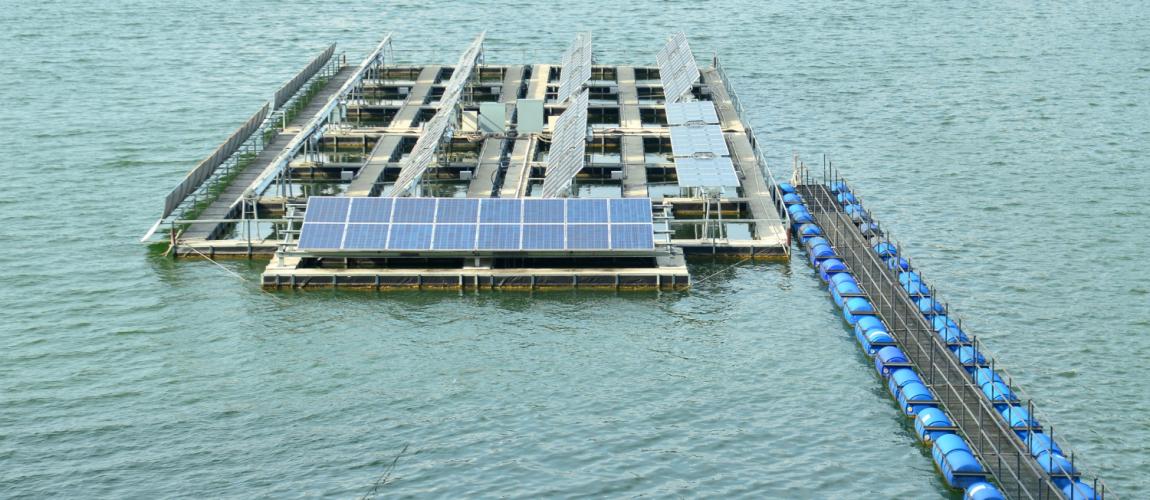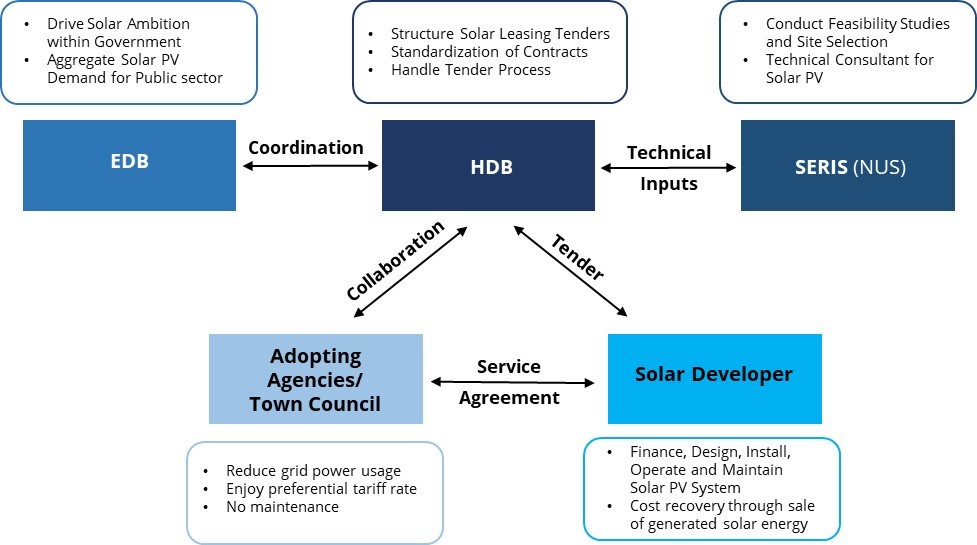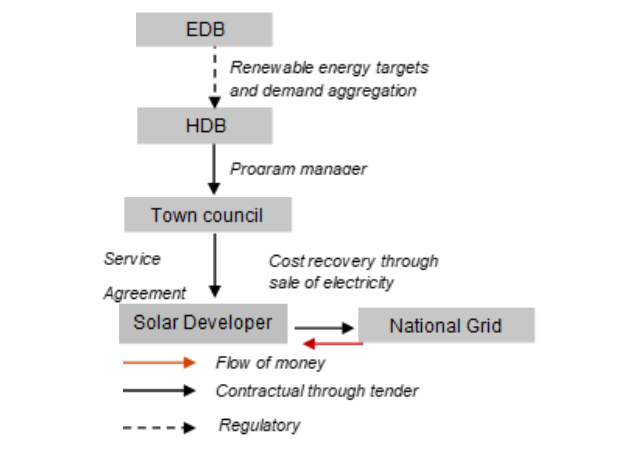SolarNova Rooftop Solar Program, Singapore

Photo Credit: Image by Freepik
On this page: Renewable energy projects can provide governments with an additional source of revenue from leasing land or water bodies to developers. Find case studies below, or visit the Guidelines on Innovative Revenues for Infrastructure section and the Content Outline, or Download the Full Report.
Project Summary: Background Utilizing rooftop spaces to deploy solar photovoltaic (PV) systems can be a viable renewable energy source especially for highly urbanized cities. The deployment of rooftop solar PV systems has increased significantly in recent years because of rapidly declining costs and supporting policies. Solar PV installations can be arranged in smaller configurations for mini-grids or domestic use. In many markets, self-consuming PV electricity is already more economically attractive than buying electricity from the grid.1 In land-scarce regions such as Singapore where other forms of renewable energy, such as wind, tidal and hydro are not viable options, there is substantial solar potential that can be harnessed by deployment on the rooftops allowing industries and housing blocks to generate renewable energy for self-use and for selling excess capacity to the grid. Project Structure Through various rooftop solar initiatives, Singapore is accelerating renewable energy generation. Private players in Singapore like Sunseap Leasing Pte Ltd. (Sunseap) have partnered with Housing Development Board (HDB) through the government’s SolarNova program which aims to accelerate deployment of solar PV systems in Singapore. In 2019, Sunseap won the fourth tender under the SolarNova program for 70 MegaWatt-peak (MWp) to install more than 170,000 solar panels on the rooftops of more than 1,200 Housing and Development Board (HDB) blocks and 49 government sites.2 With the seventh tender (SolarNova7) that will be awarded in the fourth quarter of 2022, the HDB is on track to meet the target of 540MWp of solar PV capacity by 2030.3 What sets it apart? Key players for delivering improved services The SolarNova Program is jointly led by HDB and Economic Development Board (EDB). HDB launches and awards solar leasing tenders under the SolarNova program to developers who would finance, design, install, operate and maintain rooftop solar systems. Source: https://www.hdb.gov.sg/about-us/our-role/smart-and-sustainable-living/solarnova-page Sunseap Group is a solar energy system developer, owner, and operator headquartered in Singapore. Sunseap Leasing Pte Ltd. is subsidiary of Sunseap Group that focuses on bringing rooftop solar panels at an affordable cost to homeowners. Mechanism/s for Maximizing Funding for Infrastructure Private solar PV system developers have responsibility to design, finance, install, operate, and maintain the solar PV systems. The solar energy harnessed is used to power common services in the HDB estates like lifts, lighting in common areas and pumps, helping town councils to mitigate rising energy costs through a power purchase agreement between the solar developer and town councils.6 The solar leasing model allows government agencies to purchase the solar power at a preferential rate below the retail price, and without rendering any up-front installation costs.7 Local councils directly benefit from the revenues received from the service agreement, through which they are granting the rights for use of government property rooftops for solar power generation. Typical Business Model Solar developer (Sunseap Leasing) Rooftop Owner (Adopting agencies/ Town Council) Lessons Learned Confidence for sustainable delivery for communities Managing the risks Other examples JTC in Singapore has also launched its solar deployment program on industrial buildings making solar deployment mandatory for new leases, lease renewals land-based facility launches and tenders for sites with at least 800 sqm of available and technically viable contiguous rooftop area and with remaining lease period of at least fifteen years.11 Footnote 1: Better Understanding of Rooftop Solar PV Installation Can Support Increased Deployment Footnote 2: https://www.sunseap.com/sg/news/2019/sunseap-wins-tender-for-one-of-singapore-largest-solar-projects-to-install-more-than-170000-solar-panels-on-HDB-rooftops.html Footnote 3: HDB to Bring Solar Energy to Over 8,000 Blocks through SolarNova Programme Footnote 4: https://www.sunseap.com/sg/news/2021/sunseap-secures-$85.8-million-green-loan-from-DBS-and-UOB-to-finance-singapore-largest-clean-energy-project.html Footnote 5: https://www.sunseap.com/sg/commercial/solarppa.html Footnote 6: Joint Press Release by HDB & EDB: HDB and eight other Government Organisations participate in next Solar Leasing Tender under Solarnova Programme Footnote 7: Whole-of-government coordination to accelerate solar deployment Footnote 10: https://www.sunseap.com/sg/news/2021/sunseap-secures-$85.8-million-green-loan-from-DBS-and-UOB-to-finance-singapore-largest-clean-energy-project.html Footnote 11: Singapore solar deployment

Government(HDB)
Structures solar leasing tenders, standardizes contracts and handles tendering process
As the solar developer Sunseap will finance, design, install, operate and maintain rooftop solar systems
Signs the service agreement with solar developer
The Guidelines on Innovative Revenues for Infrastructure (IRI) is intended to be a living document and will be reviewed at regular intervals. They have not been prepared with any specific transaction in mind and are meant to serve only as general guidance. It is therefore critical that the Guidelines be reviewed and adapted for specific transactions.
To find more, visit the Innovative Revenues for Infrastructure section and the Content Outline, or Download the Full Report. For feedback on the content of this section of the website or suggestions for links or materials that could be included, please contact the PPPLRC at ppp@worldbank.org.
Updated: February 26, 2024
TABLE OF CONTENTS
I. Innovative Revenues for Infrastructure (IRI)
2. Introduction to Commercial Value Capture (CVC)
3. Applying CVC in Infrastructure Projects
2. Case Studies in CVC from International Experiences
• Advertising and Marketing in High-Footfall Public Areas
• Naming Rights in Stations and City Icons
• Commercial Uses of Virtual Spaces
• Commercial Uses of Physical Places and Virtual Spaces Created on the Back of Public Infrastructure
• Control of Real Estate Development Rights to Enhance Value
• Leveraging Climate Opportunities
• Usage of Facilities During Off-Hours or Off-Seasons
• Repurposing or Adaptive Reusing of Old Assets